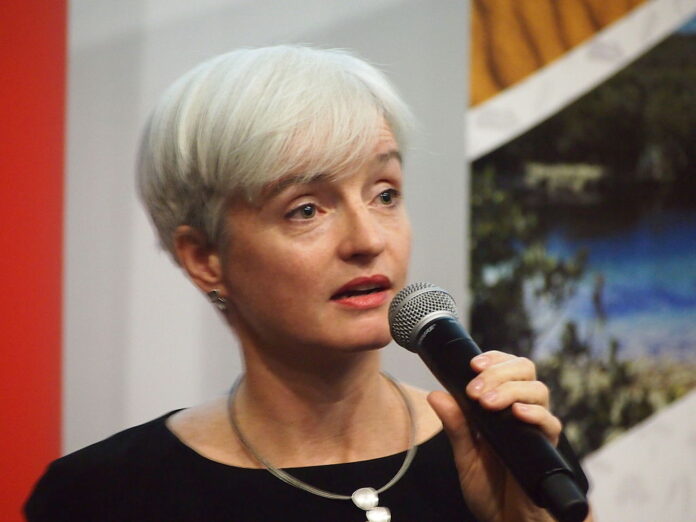Renowned marine scientist Emma Johnston takes the helm, marking a historic moment for the university as its first female leader
In a groundbreaking development for the University of Melbourne, Professor Emma Johnston has been appointed as the institution’s first female vice-chancellor. Set to assume her role in February 2025, Johnston will replace the outgoing vice chancellor, Duncan Maskell, who announced his decision to step down earlier this year amid a series of challenges faced by the university.
Professor Johnston, an esteemed scientist and the current deputy vice chancellor of research at the University of Sydney, brings over two decades of academic experience to her new position. Prior to her role at the University of Sydney, she spent more than 20 years at the University of New South Wales, where she held significant positions, including pro vice chancellor of research and dean of science. Her extensive research focuses on the ecological impacts of human activities on marine ecosystems, and she has authored an impressive 185 peer-reviewed journal articles. Notably, she is also a chief author of Australia’s current State of Environment Report.
The announcement of Johnston’s appointment comes at a time when the University of Melbourne has faced a turbulent landscape, marked by the challenges of the COVID-19 pandemic, ongoing pro-Palestinian protests, and a contentious debate regarding international student caps. The university is currently under investigation by the Office of the Victorian Information Commissioner for its use of CCTV footage to identify students involved in protests earlier this year.
Embed from Getty ImagesMaskell, who served as vice chancellor since 2018, described his decision to resign as a “bloody tough decision,” citing his age as a factor in his choice to step down. He emphasized his desire for more freedom in his personal life and career pursuits. Under his leadership, the university has navigated significant changes and challenges, but Johnston is now poised to guide it into a new chapter.
In a statement regarding her appointment, Johnston expressed her excitement about returning to her roots as a sixth-generation Melburnian. “It is a great privilege to be appointed the university’s next vice-chancellor, and I look forward to building on the work of Professor Duncan Maskell and his leadership team,” she said. Johnston’s deep connection to the area, including her childhood curiosity about the wonders of Port Phillip Bay, fuels her passion for leading the university.
In terms of compensation, the University of Melbourne reported that Maskell received a salary just shy of $1.5 million in 2023, making it the highest-paid vice chancellor in Australia. As Johnston prepares to step into her new role, her leadership will not only mark a historic moment for the university but also set the stage for further advancements in higher education.
Analysis
Political Perspective
The appointment of Professor Emma Johnston as the first female vice-chancellor of the University of Melbourne is a significant political milestone in the realm of higher education. This historic move reflects a broader trend toward gender equality and representation in leadership roles within academic institutions. Johnston’s leadership may inspire a new generation of female academics and serve as a catalyst for other universities to prioritize diversity in their executive ranks.
Johnston’s appointment may also influence discussions surrounding university governance and policy. As she steps into a leadership role during a period of scrutiny for the university, her ability to navigate these challenges will be critical. Johnston’s experience in research and academia positions her as a candidate capable of fostering collaboration and transparency, which are essential for addressing ongoing issues within the institution.
Social Perspective
Johnston’s appointment resonates with societal shifts toward recognizing and promoting women’s leadership in traditionally male-dominated fields. Her elevation to vice chancellor signifies progress in addressing gender disparities in academia. This change not only uplifts women but also emphasizes the importance of diverse perspectives in decision-making processes within higher education.
Furthermore, Johnston’s commitment to addressing ecological issues aligns with growing societal awareness surrounding environmental sustainability. Her research background in marine ecology positions her to advocate for sustainable practices at the university, potentially influencing broader conversations about environmental responsibility in academic institutions.
Racial Perspective
While Johnston’s appointment is a notable achievement for women in leadership, the university must also address racial diversity within its administrative ranks. As discussions about equity and representation continue to gain momentum, the university’s leadership should prioritize initiatives aimed at increasing diversity across all levels of administration. This will help foster an inclusive environment that reflects the multicultural fabric of Australian society.
Johnston’s leadership may serve as a platform to champion diversity initiatives, ensuring that underrepresented voices are heard and valued within the university community. A focus on racial equity will enhance the institution’s reputation as a progressive leader in higher education.
Gender Perspective
The significance of Johnston’s appointment extends beyond gender equality; it challenges prevailing gender norms within academia. By breaking the glass ceiling as the first female vice-chancellor, Johnston paves the way for other women aspiring to leadership positions. Her presence in a top role sends a powerful message that gender should not be a barrier to success in academia.
Moreover, Johnston’s leadership style, shaped by her experiences as a female scientist, may foster a more collaborative and inclusive culture at the University of Melbourne. Her commitment to mentorship and support for female academics can contribute to a more equitable academic environment.
Economic Perspective
From an economic standpoint, Johnston’s appointment represents a strategic move for the University of Melbourne as it navigates financial challenges. With the institution facing scrutiny over various issues, including COVID-19 impacts and protests, her leadership can drive efforts to enhance financial stability through innovative research and partnerships.
Johnston’s focus on marine ecology and environmental sustainability aligns with global trends emphasizing the importance of green initiatives. By prioritizing research that addresses pressing ecological concerns, she can attract funding and resources that benefit both the university and the broader community.
